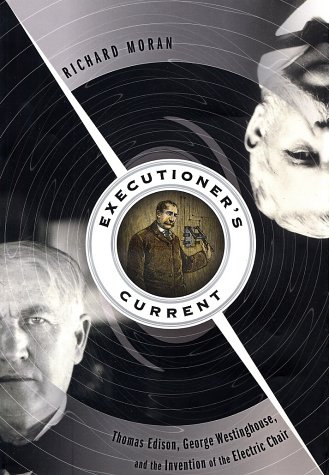Items related to Executioner's Current: Thomas Edison, George Westinghous...
Executioner's Current: Thomas Edison, George Westinghouse, and the Invention of the Electric Chair - Hardcover

In 1882, Thomas Edison launched “the age of electricity” by lighting up a portion of Manhattan with his direct current (DC) system. Six years later George Westinghouse lit up Buffalo with his less expensive alternating current (AC). They quickly became locked in a battle for market share. Richard Moran shows that Edison, in order to maintain commercial dominance, set out to blacken the image of Westinghouse’s AC by persuading the State of New York to electrocute condemned criminals with AC current. Westinghouse, determined to keep AC from becoming known as the “executioner’s current,” fought to stop the first electrocution, claiming that use of the electric chair constituted cruel and unusual punishment. The legal battle that ensued ended when the Supreme Court refused to rule. The electrocution of William Kemler went forward in New York’s Auburn Pen-
itentiary in August 1890—and was horribly botched.
Moran makes clear how this industry tug-of-war raised many profound and disturbing questions, not only about electrocution but about the technological nature of the search for a humane method of execution. And the fundamental question, he says, remains with us today: Can execution ever be considered humane?
A superbly told tale of industrial and political skullduggery that brings to light a little-known chapter of modern American history.
"synopsis" may belong to another edition of this title.
"Two Titans of capitalism locked in bitter public battle over the means of killing convicted murderers --
it is a macabre and enthralling story. In Executioner's Current, Richard Moran, a fine social historian,
takes us in a crisp and incisive narrative to the heart of the emotional confusion that still characterizes
American capital punishment."
--Norval Morris, author of Maconochie's Gentlemen
"Although the insidious lethal injection, which Richard Moran chillingly observes being adminstered,
is now in fashion, the symbol for the Death Penalty remains the electric chair. It adds a timely
twenty-first century dimension to the wretched thing to learn that Mr. Edison's contribution to the
American criminal justice system was born of corporate greed. With the Death Penalty at last being
revisited, Executioner's Current is a valuable contribution to the much-needed national conversation."
--William S. McFeely, author of Proximity to Death
"Executioner's Current is a brilliant description how the electric chair
became one of America's first electric appliances. Moran's research is
meticulous, his writing is superb, and his scholarship is unusually
insightful. He shows how today's search for a more humane method to
execute prisoners, now focused on lethal injection, has long historical
roots and will continue as long as the executioner is in our employ."
--Michael L. Radelet, author of In Spite of Innocence
"Moran is a wonderful storyteller, and the history of the electric chair - -
with rich A-C, D-C electric mogels trying to destroy each other's business
- - makes a fascinating tale of greed, opportunism and hypocrisy. Thomas
Edison's attempt to make George Westinghouse into America's Dr. Guillotine
is worth reading by everyone who cares about business ethics, the death
penalty and justice."
--Alan M. Dershowitz, author of Why Terrorism Works: Understanding the Threat,
Responding to the Challenge
"Richard Moran has written a terrific book, a wise and compelling account of
an episode in American history that speaks to some of today's mostly deeply
held beliefs about capital punishment. He writes with the flair of a fine
novelist and the passion of a morally committed scholar. The result is a
riveting story of the invention of the electric chair and a singular
contribution to the modern debate about whether the state can ever kill
painlessly, decently, humanely."
--Austin Sarat, author of WHEN THE STATE KILLS: CAPITAL PUNISHMENT AND THE
AMERICAN CONDITION
"The moral of this well told tale, as I read it, is that our obsession with
the technical question of how to execute convicted criminals has become a
convenient substitute for the ethical question of whether we really believe
in capital punishment at all."
--Joseph J. Ellis, author of Founding Brothers: The Revolutionary Generation
"About this title" may belong to another edition of this title.
- PublisherKnopf
- Publication date2002
- ISBN 10 0375410597
- ISBN 13 9780375410598
- BindingHardcover
- Edition number1
- Number of pages304
- Rating
Buy New
Learn more about this copy
Shipping:
US$ 3.50
Within U.S.A.
Top Search Results from the AbeBooks Marketplace
Executioner's Current: Thomas Edison, George Westinghouse, and the Invention of the Electric Chair
Book Description Hardcover. Condition: New. No Jacket. 1st Edition. The electric chair developed out of the effort by Thomas Edison to blacken the name of his competitor Westinghouse. Westinghouse used AC current, and Edison convinced New York state to use alternating current to electrocute a prisoner on death row. The execution was horribly botched; Moran examines the competition that led to this new use of electricity, and many other issues associated with it. b/w illustrations, Notes, Index. Published @ $25.00. Seller Inventory # 015653
Executioners Current: Thomas Edison, George Westinghouse, and the Invention of the Electric Chair
Book Description Condition: New. . Seller Inventory # 52GZZZ020AWJ_ns
EXECUTIONER'S CURRENT: THOMAS ED
Book Description Condition: New. New. In shrink wrap. Looks like an interesting title! 1.35. Seller Inventory # Q-0375410597

